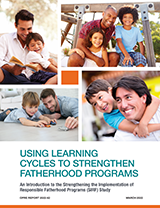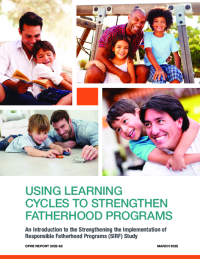Using Learning Cycles to Strengthen Fatherhood Programs
An Introduction to the Strengthening the Implementation of Responsible Fatherhood Programs (SIRF) Study

 Introduction
Introduction
This report summarizes activities in the first two years of the Strengthening the Implementation of Responsible Fatherhood Programs (SIRF) study (2019 to 2021). SIRF aims to identify and test approaches to improving programs’ recruitment, engagement, and retention of fathers using rapid learning cycles. During the first two years, the study team identified challenges that fatherhood programs face in engaging men and promising approaches for addressing those challenges, selected programs to participate in SIRF, and began collaborating with those programs on research activities. In 2021, fatherhood programs began iteratively implementing and assessing promising approaches to addressing implementation challenges with the support of and in partnership with the SIRF team.
During the learning-cycle stage, SIRF is working for one year with nine Responsible Fatherhood grantees and one former grantee, each of which is testing an approach that falls into one of three broad categories:
- Coaching. Coaching techniques are employed in case management. Staff members use open-ended questions to talk with fathers about their goals and how to achieve them. This approach is designed to increase the number of fathers who complete the program.
- Outreach. Programs use innovative ways of conducting outreach and intake to enroll more fathers into programs and encourage more fathers to show up for initial workshops.
- Peer support. Program alumni or fathers with experience with the program serve as mentors to new fathers with the aim of increasing the number of fathers who persist through the program.
The sites began learning-cycle activities in July 2021; they will conclude after about 12 months. Final results from the study are expected to be released in 2023. They will include an assessment of whether the approaches improve fathers’ enrollment and participation in programs and a description of the experience of implementing each approach.
Primary Research Questions
- Are the implemented approaches improving fathers’ participation in the programs?
- What aspects of the approaches were most challenging for programs to implement? What aspects did they implement most successfully?
Purpose
Federally funded Responsible Fatherhood programs work with fathers to promote healthy relationships and marriages, strengthen parenting practices, and help fathers attain economic stability. For programs to improve fathers’ outcomes, they need to be able to recruit fathers, engage them in services, and keep them actively participating in program activities. However, it is challenging to achieve these participation goals. These implementation challenges also make it difficult to carry out rigorous tests of program services to determine whether they affect the targeted outcomes, and if so, how.
SIRF is designed to strengthen programs and build evidence on promising practices to improve the enrollment, engagement, and retention of fathers in program activities. Fatherhood programs are iteratively implementing and assessing promising approaches to addressing implementation challenges, with the support of and in partnership with the SIRF team. This report describes the study’s activities in its first two years (2019 to 2021). Study activities during that time have included identifying challenges that fatherhood programs face in engaging men, along with promising approaches for addressing those challenges; selecting programs to participate in SIRF; and engaging those programs in research activities.
Methods
SIRF involves a variety of methods based on the specific approaches and study designs at the various programs.
- Programs in the outreach and peer support clusters are using random assignment, where about half of its fathers receive the approach being tested and half receive a more standard version of outreach or support. The difference in outcomes between the two groups represents the effect of the approach being tested.
- The analysis for programs in the coaching cluster is comparing participation data before and after the approach is implemented and comparing participation in those programs with participation in similar Fatherhood grantees that are not in SIRF.
- A mixed-methods implementation study is collecting qualitative and quantitative data from program staff members and fathers associated with each program, across all of the rapid learning cycles. These data sources address questions about what it took to implement the approaches and how staff members and fathers experienced them.






